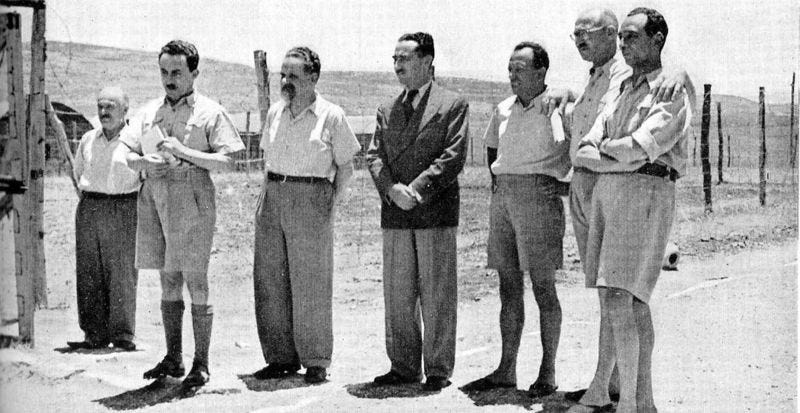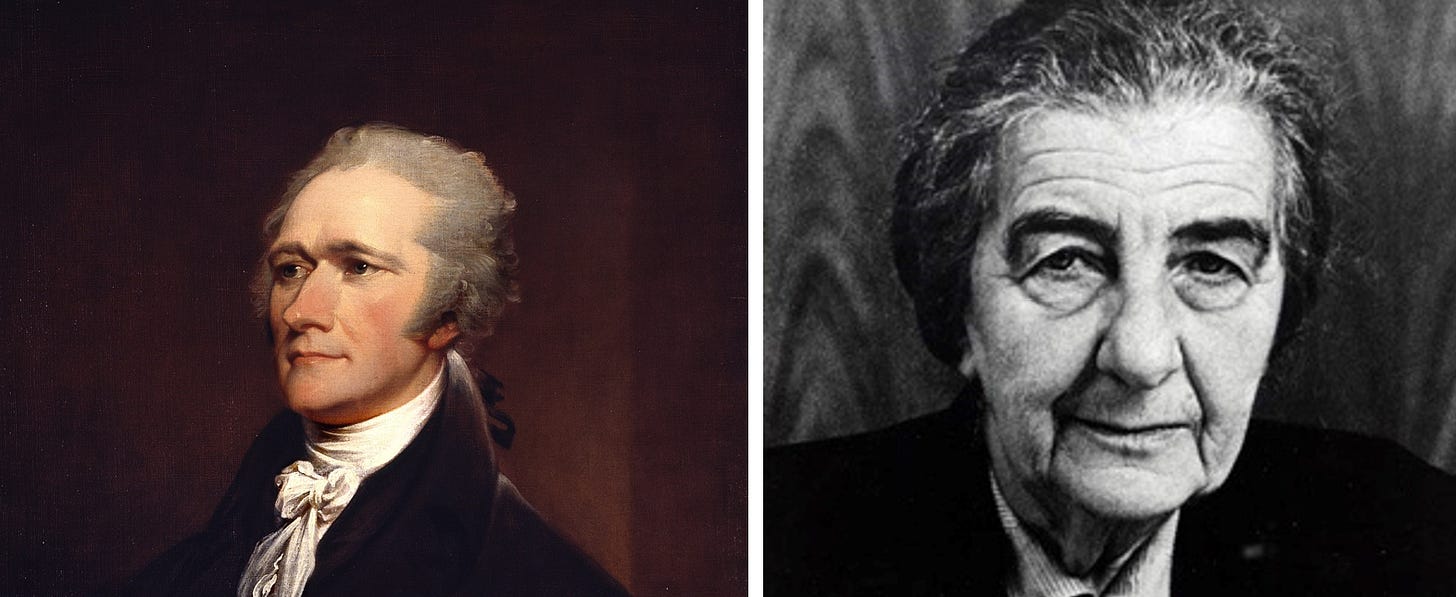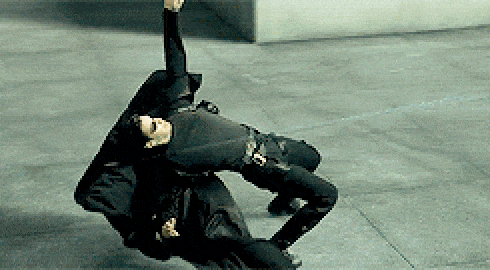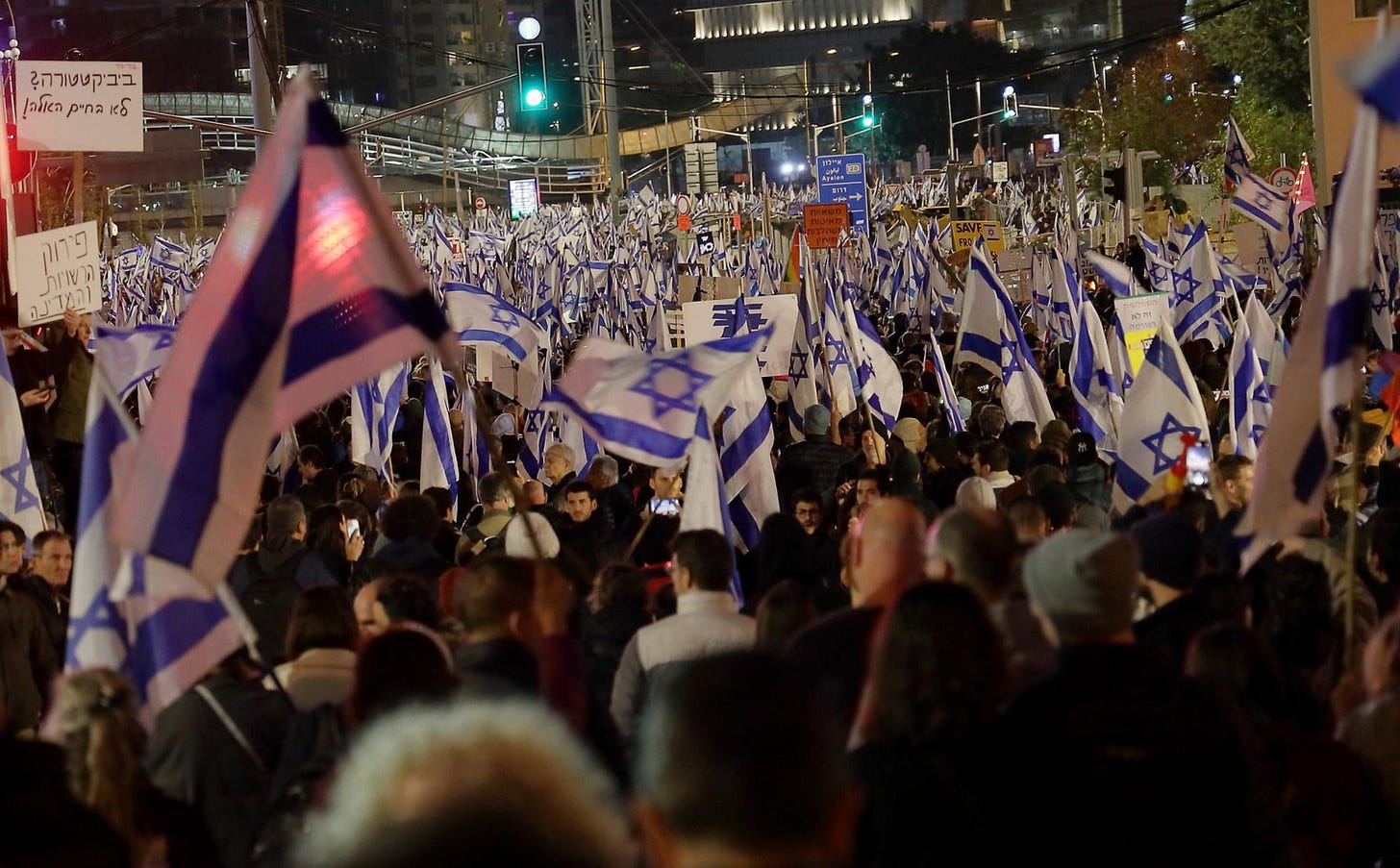Black Sabbath
On Saturday, June 29, 1946, the British Mandatory powers in Palestine initiated Operation Agatha, later dubbed “Black Sabbath” (השבת השחורה). It was a heavy-handed response to Jewish underground militia actions against the British in Palestine. In the months leading up to the operation, those militias, operating as one United Resistance Movement, had been bombing bridges and railway stations, post and tax offices, and other parts of the Mandate’s civilian infrastructure.
From June 29 to July 1, 1946, 20,000 British security officers threw a net down over Palestine’s Jewish community. They imposed curfews, erected roadblocks, raided the offices of the Jewish Agency, the Histadrut, and the Women’s International Zionist Organization. 27 settlements and kibbutzim were searched/ransacked, and 2,718 people were arrested and detained at the Latrun internment camp. Those detained included four members of the Jewish Agency Executive, seven Haganah officers, and half of the Palmach’s fighting force. Many of those detained were Holocaust survivors who once again found themselves behind barbed-wire.
Among those leaders detained were prominent Zionists, including Moshe Sharett (to-be Israel’s 2nd Prime Minister), and David Remez (the Chair of the Jewish National Council). The British referred to them as VIJs (Very Important Jews).

Convictions of Leadership
In the last month, two experiences have led me to think more seriously about the role of leaders.
First, I finally saw Hamilton. Several months ago I read the book that the play is based on, and it’s been stuck in my mind ever since. Alexander Hamilton was a fascinating and astounding political figure. Aside from his sheer brilliance and the impact on history he had in his 47 short years, the play did a great job at portraying Hamilton as someone who acted on his convictions. He did not care who he upset or offended, but he worked things out in his mind, moving forward knowing that his ideas were worth implementing. History proved him right. It also helps that he worked nonnnn-stop.
One of the themes that underlies the play is the dichotomy between Hamilton and Aaron Burr. From the very start, Burr implores Hamilton to “talk less, smile more, don’t let them know what you’re against or what you’re for. You wanna get ahead? Fools who run their mouths off wind up dead.” This stands in stark contrast to Hamilton immediately getting on the soapbox and challenging Samuel Seabury in Farmer Refuted, a Loyalist who was against the American Revolution. Hamilton is consistently disappointed in Burr who he believes does not stand for something, which Hamilton concludes will lead to Burr falling for anything. To him, leadership is about taking a stand, right or wrong.
Secondly, I have been reading Lioness, by Francine Klagsbrun, a biography of Golda Meir. Golda was a leader akin to Hamilton. Indeed, a woman rising to the levels of political power she attained at that time had to be made of a strong will. And she was. In reading about Golda’s life and political career, you learn that she was forceful in her positions, made up her mind and stuck with it (for better or worse), and led with her convictions too.
These were just some of the reasons that Golda Meir became known as Israel’s Iron Lady. She had a set of beliefs that she stuck to, and at the end of the day, she believed in the Jewish people, in Israel, and Zionism. She, more than anyone else, espoused the belief that Israel had to succeed because - ein brera - there was no alternative. There was no alternative to making the desert bloom, or defending the homeland, or raising money for a good cause. If not for Golda, the State of Israel today would look quite different, if there even was a state at all.
In fact, Golda was also one of those VIJs in 1946. Not arrested by the British (likely because she was a woman), she was appointed to replace Moshe Sharett as the head of the Jewish Agency’s Political Department, a position she held until Israel’s establishment two years later. Golda wasn’t perfect - neither was Hamilton - but they knew that, and that was OK.
Principled leadership
This old-school principled leadership is a refreshing thought at a time when the leaders we see on television today are a little too polished (except for one…). Their remarks are diligently crafted, having been written and rewritten by aides and allies. They speak with their base in mind, or having read the latest polls or results from a focus group. They have their minds focused on re-election or, in some cases, the avoidance of criminal convictions (yup, that one), and there is a selflessness that appears today to be largely missing from political leadership. Maybe I’m idealistic, but it is rare that we see truly selfless acts in politics anymore. Yes, speaking up may result in you losing your job, but politics is a fickle job.
On the other hand, we also have local leadership in the Jewish community who are thankfully very different from politicians. By virtue of the way Diaspora Jewish communities were established and built up over the last century, those main institutions in our respective communities are social service providers dependent on donations to make the community around them thrive. Thus, community leadership’s concern is not necessarily their base, per se, but frequently their donors, and with good reason.
Take UJA for example. UJA does a remarkable job keeping the lights on in our community. They fund social service agencies, day schools, community centres, and advocacy initiatives. That is their primary role and they do it well. They were not necessarily built to be an institution expected to speak out on every issue that our community faces, but because of the position they have come to occupy, and frequently their claim to speak for the community, this is what people now expect.
This is a difficult position to be in. In a world where everyone wants everyone to express an opinion and make clear where they stand on every single social issue, people expect the same of their institutions. Is it unreasonable? Perhaps in some cases, but in others, maybe not.
Staying silent on Israel
This problem has reared its head of late, given the atmosphere of unrest that has emerged in Israel. People in Israel and the Diaspora want to know: are you for or against the judicial reform? Are you pro- or anti-Bibi? Do you think that Israel’s democracy is dying a slow death, or is this just a step in the judicial evolution of a liberal democratic state? Do you believe the Diaspora has a right to criticize Israel’s domestic politics? Is Israel democractic, autocratic, theocratic, or juristocratic?
These are the questions thrown around today, and these same questions our community institutions try to avoid like Neo dodging bullets in that cool scene in the Matrix.
If you read almost any statement from a mainstream Jewish organization over the last several months related to Israel, there is a vagueness. They stand with Israel and the people of Israel, or are troubled by the situation on the ground. They call on level heads to prevail, on a compromise solution, or a national unity government, or on President Herzog to knock heads together, while praising the Israeli spirit of peaceful protest.
They do this knowing that no matter how milquetoast their statement is, they are still going to get pushback. The next day, they will be beset by voicemails and emails from community members upset that they opened their mouths in apparent criticism of Israel, or from others upset that they didn’t also condemn the protestors shouting at Sara Netanyahu in a hair salon.
There is no winning, but that’s ok; it is part of the work they do.
What to expect of VIJs
The leaders of these institutions are often our communities’ obvious VIJs. But should those VIJs be more willing to speak out, to stand by their own convictions and just hope that community members and donors will understand? Or should they continue down the path of making safe statements that appeal to the lowest common denominator? This is not to say that one way is principled or not, but there is room in the middle, in which we can better perpetuate the ideals of Jewish leadership.
Let’s take the judicial overhaul crisis in Israel as an example. As I wrote in my last post, I am not yet convinced that Israeli democracy is crumbling, nor that Israel is at its breaking point. I am of course troubled by events on the ground, but I think that we in the Diaspora are not hearing the full story. From my understanding, the majority of Israelis believe there is a need for some form of judicial overhaul but differ over the approach. There are also far more pro-overhaul protestors than we in the Diaspora are told about, given that our exposure here is mostly to those who oppose this government, this coalition, and this prime minister.
With this in mind, I’m not completely satisfied with the responses that I’ve heard from many of our community organizations. Most statements have shied away from taking a stand, not wanting to take a side or be on the wrong side of history. Many have simply adopted the position that Israel is in trouble, or that Israel’s democracy is at risk, without truly delving into it or trying to educate their stakeholders about what is actually happening on the ground. There is a gap, and we must be extremely cautious with how it is filled.
In February 2023, Matti Friedman, Daniel Gordis, and Yossi Klein HaLevi wrote an article entitled, “An open letter to Israel’s friends in North America,” imploring the Diaspora community to speak up and denounce the proposed judicial overhaul and current coalition government, as “Israeli leaders need to hear where you stand.” In a more recent podcast, Friedman lamented the silence from those North American Jewish organizations since the publication of his article, noting his disappointment that few, if any, Diaspora organizations tried to assert themselves in the discourse over the proposed legislative changes, to try make an impact.
What could they have said that would have been productive? I’m not sure, but this silence feels contrary to what Jewish leadership can and should be. I would like to see our organizations be less afraid of offending others, even if it is their donors or members of their base. If their supporters are loyal, then they will understand that sometimes friends disagree. There are also people behind each institution who hold their own personal views. Yes, we live in a hyper-sensitive world, but if you seek a position of leadership, you must be confident wielding your power. You must also have thick skin. Judaism is a religion of rebellion; of pushing back when we disagree, or asserting ourselves as needed.
There are plenty of loud left-wing and centrist voices in the community who have no problem condemning Israel’s government. When other organizations are muted in their approach to this issue, it may lead those moderates to conclude that the organizations must have a contrary or opposite position, otherwise they would have spoken out too.
Even with those assumptions aside, there is also no shortage of bad actors in the Israel discouse. There are plenty of anti-Israel activists who are happy to throw around lies, distorted facts/figures, and propaganda against Israel to push a specific agenda against the Jewish State. It should then be the responsibility of our community’s institutions to come out swinging against such nonsense. Tragically, many people (inside and outside of our community) are willing to believe the garbage being spewn by the anti-Israel side, and our community VIJs must be loud, and push back harder against the often obvious lies coming from the other side. They will be rewarded for doing so.
This goes not only for the judicial overhaul process, but other events in Israel too. If, for example, a terror attack in Israel results in the deaths of Israeli civilians, of course commemorate the dead, but also call out the perpetrators, name them, and condemn their actions as vile acts of war. There is no need to be subtle when it comes to the murder of innocent civilians.
Today, there are dynamics at play that are anathema to Jewish community values. Everyone, from community member to those VIJs, will struggle to fit those dynamics into our community’s paradigm. Some will fit, while others won’t. But there is a need for a public discourse about those dynamics, wherein those espousing different views respect each other for merely speaking out, when so many people are scared to do so at risk of being cancelled, or having their donation cheques voided. This however should not be what spurs our community to action. We should be impressed by organizations that speak out, not disappointed, especially today when speaking out is fraught with risks.
I would like to see community leaders participate in more town hall meetings, panel events, or roundtable discussions, that invite community members to engage in productive conversations. We should encourage debate and participation, as the current forums for those difficult conversations (Facebook, X, etc.) are simply counter-productive. The pandemic is over. Let’s get back to saying things to each other’s faces rather than from behind a screen.
Jewish leadership is principled leadership. Our leaders have never shied down from a fight, whether it was Moses asking Pharaoh to let his people go, or Menachem Begin telling Senator Joe Biden that he is not a Jew with trembling knees. Leaders take risks, fall down, resign, get fired, but find their way back up.
Golda once said, “I can honestly say that I was never affected by the question of the success of an undertaking. If I felt it was the right thing to do, I was for it regardless of the possible outcome.”
Our community is blessed with countless VIJs, but the status quo has become uncomfortable. They can really start to shake things up.






